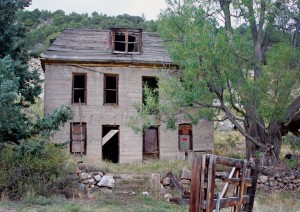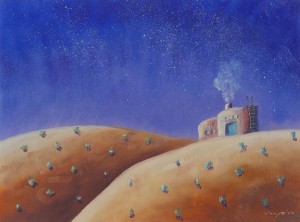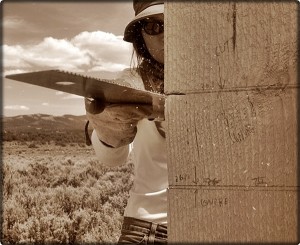By Ed Quillen
What “home” means to you often depends on where you grew up. For me, growing up in high and dry Colorado, “HOMES” was a mnemonic, a memory aid, for remembering the names of the Great Lakes: Huron, Ontario, Michigan, Erie, Superior. Even though they were hundreds of miles away, we were expected to learn them in grade-school geography.
But Martha, who grew up in Michigan, had never heard of HOMES for the Great Lakes. There, she said, “you just know the names of the Great Lakes. Kind of like you Colorado kids just knew that Elbert and Massive were the state’s two highest peaks.”
And besides, she said, HOMES just gives you the names of the lakes, not their locations or qualities. It won’t tell you that Ontario is the easternmost or that Erie is the shallowest. Fair enough, but if pressed to name the great lakes, I’d fall back on HOMES.
Mnemonics are wonderful things, though they may not always be polite. In electronics, the ohm-age of resistors is presented in a color code: Black, Brown, Red, Orange, Yellow, Green, Blue, Violet, Gray, White. Which produced this mnemonic (which has doubtless fallen out of use in these enlightened times): Bad Boys Rape Our Young Girls, But Violet Gives Willingly.
I never thought it was that hard to remember the names of the planets in order from the sun: Mercury, Venus, Earth, Mars, Jupiter, Saturn, Uranus, Neptune and, back them, Pluto, which has since been demoted. At least I found it easier to remember the planets that some mnemonic like Mary Virginia Eats Many Jam Sandwiches Under Nellie’s Pillow.
And I’ve found it simpler to recall an approximation of pi as 3.1415926 than to remember “May I have a large container of coffee?” (The number of letters in each word provides the corresponding digit of pi.)
When you hand-set lead type, you generally work from a California job case. The upper-case letters are in alphabetical order, except that J and U are at the end, because they didn’t become letters until after printing was invented. Before that, I and V served for themselves and J and U. That’s why you see “PVBLIC LIBRARY” on buildings; it’s in imitation of the Romans, who used a V where we’d use a U.
You needed the mnemonics on the lower case, whose middle row you learned as “Be careful driving elephants into small Ford garages.” The letters were b-c-d-e-i-s-f-g, and the other rows had “villains usually take three-em-spaces and run” and “let me now help out your punctuation with commas.”
And I could continue wandering way off topic here by explaining that an “em” is a typographical measurement of width equal to a font’s height; i.e., an em in 12-point type would be 12 points wide (there are approximately 72 points in an inch), and “three-em” here is a contraction for “three to the em” or “one-third em” or 4 points, and that’s the normal spacing between words. An en is half an em. Since “en” and “em” are hard to distinguish in speech, they were often spoken as “mutton” and “nut.”
I find it wonderful that trades – printing, railroading, mining, carpentry – have their own lexicons, sets of specialized terms. It was one of many things that I disliked about the commercial laundry trade that I was raised in; there wasn’t much of a specialized vocabulary, and so it never seemed like a traditional skilled craft.
Our vocabulary was quite prosaic. Shirts got ironed on “shirt presses.” Towels tumbled dry in “tumblers.” Sheets were pressed in a “flatwork ironer.”
That machine had another name. Once I was working the sorting table and there was a note with some family laundry. It sounded really sarcastic: “Please mangle our sheets better next time.”
Turned out that “mangle” was a lay term for what we professional laundrymen called the flatwork ironer. But I’d never heard it in that sense before; to me, mangle meant to tear or twist, as in “Several mangled bodies were found in the wreckage.”
That said, a commercial laundry often felt like home on a cold winter day. The laundry had warmth to spare, for steam lines ran throughout the plant. That made for misery in the summer, but it was comforting in the winter. The machinery made familiar growls, and just as with other homes, there was family, my dad or one of my brothers. I could feel “at home” in a washroom.
But that was in Greeley or Longmont, the area I grew up in. And for several years after moving to Salida, I kept thinking that it was just a temporary stop, that we’d soon be moving back there, to some city along the Front Range.
Salida was where we lived, but it wasn’t home. One way to tell was that we generally spent our family holidays, like Thanksgiving and Christmas, at my folks’ house in Longmont. Salida wasn’t the place to go “home for the holidays.”
That all seemed to change in an instant. I don’t remember the exact date, sometime in the early 1980s. I need to set the scene.
Somebody in downtown Salida had a mechanical bellhop. It was metal, five or six feet tall, and painted to look like the “Call for Phillip Morris” fellow in the old cigarette ads. This one could be plugged in, and its right arm would wave up and down. Out on the hand was a small red bulb.
Often this contraption would be set up on the sidewalk of the 100 block of East First Street, although I can’t remember for sure. It was rather ludicrous when I think back on it, this steel bellhop waving its arm. But it was part of Salida (until somebody took it and dumped it in the river, but that’s another story, one I don’t know).
So there’s the silly bellhop foolishly waving its arm with the red light on First Street on one of our rare cloudy, misty days. And I was driving back into town with Martha and the kids after a rather unpleasant visit to the Front Range – I don’t remember particulars, just that I felt glad to be headed back into the mountains.
We came down First Street, and there, a couple of blocks ahead, that bizarre bellhop was waving at us. “What a strange little town this is,” I thought, laughing at the spectacle, “but I’m home.”
And from that time on, Salida has seemed like home. I should point out, perhaps, that we’re in a different house now than we were then. It irks me to see real-estate ads touting “homes for sale.” It’s sort a rule of the industry that “We sell homes, not just houses.”
But it’s living in a place that makes it “home,” not buying it. Lots of people are at home in rentals. Investors buy houses, not homes. Or more precisely, they buy “income properties.” This whole commercial focus on “home” contradicts the old poem about how “it takes a heap o’ livin’ in a house t’ make it home.” It takes some mishaps and botched repairs and welcome improvements and some joy and some sorrow.
But that commercial perversion of the concept of “home” is rather mild compared to recent political uses of the word, especially “homeland security.” The phrase has a menacing, Orwellian sound. Nazi Germany was a “fatherland” and the Soviet Union called itself a “motherland.” Then there are the Disney fabrications of Tomorowland and Frontierland, etc. So “Anythingland” leaves a sour taste.
And what do they mean by “homeland?” As I noted, Salida has felt like home for years. But the Salida I lived in then had 20 trains a day running through town, plus the quarry train that ran to Monarch on summer days. Our government has not strained itself to preserve that aspect of this “homeland.”
Gamble’s is gone, Cady Hardware is gone, various plumbers and mechanics I relied on have died or retired. I could go on, but the point should be clear that much of what made Salida my “homeland” circa 1983 is long gone. We live in a dynamic economy and there really isn’t such a thing as “security” for the little “homelands” we cherished over the years.
So maybe it would be best if we quit using the word “home.” It’s been so co-opted by commerce and politics that you have to work at it to use the word in its traditional sense. Unless, of course, you need to name all the Great Lakes.



